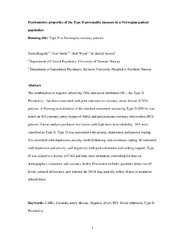Psychological factors in the recovery of coronary artery disease patients in Northern Norway
Permanent link
https://hdl.handle.net/10037/2104View/
Bergvik, S., Sørlie, T., Wynn, R., & Sexton, H.: 'Psychometric properties of the Type D personality measure in a Norwegian patient population.' Submitted version, article forthcoming in Scandinavian Journal of Psychology. Reprinted with permission. (PDF)
Thesis introduction (PDF)
Date
2009-06-05Type
Doctoral thesisDoktorgradsavhandling
Author
Bergvik, SveinAbstract
The thesis comprises four studies of psychosocial factors associated with the recovery of patients following Coronary Artery Bypass Graft (CABG) surgery and Percutaneous Coronary Intervention (PCI) treatment in Northern Norway. Paper I describes an interview study of nine patients following CABG surgery. The patients reported extensive use of avoidant (e.g. neglecting symptoms, avoiding thoughts about illness) and approach coping strategies (e.g. persistently searching for a diagnosis, mentally preparing for surgery). In paper II, a Norwegian translation of the Type D personality measure (DS14) was tested in a survey
of 432 CABG and PCI patients. The instrument showed acceptable psychometric properties.
The prevalence of Type D personality was relatively low (18%) compared to other European and US studies. Based on the same survey, paper III describes a study of psychosocial and treatment factors associated with Return To Work (RTW) in 185 CABG and PCI patients that were working prior to hospitalization. Six independent and significant factors were associated
with RTW, including age below 67 years, higher education and Internal Locus of Control (LoC) as positive predictors. CABG, smoking and Powerful Others LoC were negative
predictors. Paper IV describes the development, training and implementation of a patientcentred information procedure provided by nurses to CABG patients. Using a qualitative method, a set of case descriptions was developed, illustrating difficult nurse-patient interactions and how the patient-centered approach could be applied in these situations. The nurses found the patient-centered approach useful in a range of communicatively challenging
situations, including when patients asked a very high number of questions, when patients
seemed to have difficulties expressing their worries, when patients had many complaints, and when spouses of patients expressed their own worries.
Description
Papers number 1 and 3 of the thesis are submitted versions, and not available in Munin. Paper 4 is not available due to publisher's restriction:
1. Bergvik, S., Sørlie, T., & Wynn, R.: 'Approach and avoidance coping and Regulatory Focus in patients having Coronary Artery Bypass Graft surgery.'
3. Bergvik, S., Sørlie, T., Wynn, R., & Sexton, H.: 'Psychosocial factors associated with return to work following CABG and PCI treatment in coronary patients in Northern Norway.'
4. Bergvik, S., Wynn, R., & Sørlie, T. (2008): 'Nurse training of a patient-centered information procedure for CABG patients.' Patient Education and Counseling, 70, 227-233 (Elsevier). Available at http://dx.doi.org/10.1016/j.pec.2007.10.013
1. Bergvik, S., Sørlie, T., & Wynn, R.: 'Approach and avoidance coping and Regulatory Focus in patients having Coronary Artery Bypass Graft surgery.'
3. Bergvik, S., Sørlie, T., Wynn, R., & Sexton, H.: 'Psychosocial factors associated with return to work following CABG and PCI treatment in coronary patients in Northern Norway.'
4. Bergvik, S., Wynn, R., & Sørlie, T. (2008): 'Nurse training of a patient-centered information procedure for CABG patients.' Patient Education and Counseling, 70, 227-233 (Elsevier). Available at http://dx.doi.org/10.1016/j.pec.2007.10.013
Publisher
University of TromsøSeries
Skriftserie (Universitetssykehuset Nord-Norge. Psykiatrisk forsknings-og utviklingsavdeling), nr 15Metadata
Show full item recordCollections
Copyright 2009 The Author(s)
The following license file are associated with this item:


 English
English norsk
norsk